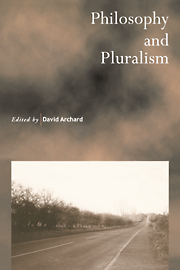Book contents
- Frontmatter
- Contents
- Notes on Contributors
- Introduction
- Philosophy in Different Cultural Contexts
- A Case for Philosophical Pluralism: The Problem of Intentionality
- William James, ‘A Certain Blindness’ and an Uncertain Pluralism
- Cultural Realism: the ancient philosophical background
- Religion and Pluralism
- A Single True Morality? The Challenge of Relativism
- Pluralism, Realism and Truth
- Value-Pluralism
- Moral Philosophy and its Anti-pluralist Bias
- Coping with the Many-Coloured Dome: Pluralism and Practical Reason
- Rawlsians, Pluralists, and Cosmopolitans
- Political Liberalism, Secular Republicanism: two answers to the challenges of pluralism
- ‘Race’ in Britain and the Politics of Difference
- Tragedy, Moral Conflict, and Liberalism
- References
Moral Philosophy and its Anti-pluralist Bias
Published online by Cambridge University Press: 30 October 2009
- Frontmatter
- Contents
- Notes on Contributors
- Introduction
- Philosophy in Different Cultural Contexts
- A Case for Philosophical Pluralism: The Problem of Intentionality
- William James, ‘A Certain Blindness’ and an Uncertain Pluralism
- Cultural Realism: the ancient philosophical background
- Religion and Pluralism
- A Single True Morality? The Challenge of Relativism
- Pluralism, Realism and Truth
- Value-Pluralism
- Moral Philosophy and its Anti-pluralist Bias
- Coping with the Many-Coloured Dome: Pluralism and Practical Reason
- Rawlsians, Pluralists, and Cosmopolitans
- Political Liberalism, Secular Republicanism: two answers to the challenges of pluralism
- ‘Race’ in Britain and the Politics of Difference
- Tragedy, Moral Conflict, and Liberalism
- References
Summary
It is an obvious fact of history that human beings have always entertained and continue to entertain different conceptions of the good and lead very different lives both individually and collectively. This raises two questions. First, why do ways of life differ? And second, how should we respond to their differences? The first is an explanatory, and the second a normative question, and the two are closely related. The first question has been answered differently by different writers, of which I shall mention three by way of illustration.
First, for some writers such as Montesquieu and Holbach, whom I shall call naturalists, differences between ways of life arise out of differences in climate, geographical conditions, history and temperament of the people concerned. Just as different vegetations grow in different places, different societies throw up different ways of life depending on their natural and historical contexts.
Secondly, some writers such as Herder and Shelley, whom I shall call romantics, argue that differences owe their origins to the fact that as free, creative and imaginative beings, human beings think differently, value different goals, experiment with new ideas and ideals, strive after new forms of social organisation, and evolve ways of life best suited to their self-understanding and needs. The differences are not accidental products of external factors and contingent in character, but deeply rooted in man's creative nature.
- Type
- Chapter
- Information
- Philosophy and Pluralism , pp. 117 - 134Publisher: Cambridge University PressPrint publication year: 1996
- 2
- Cited by



